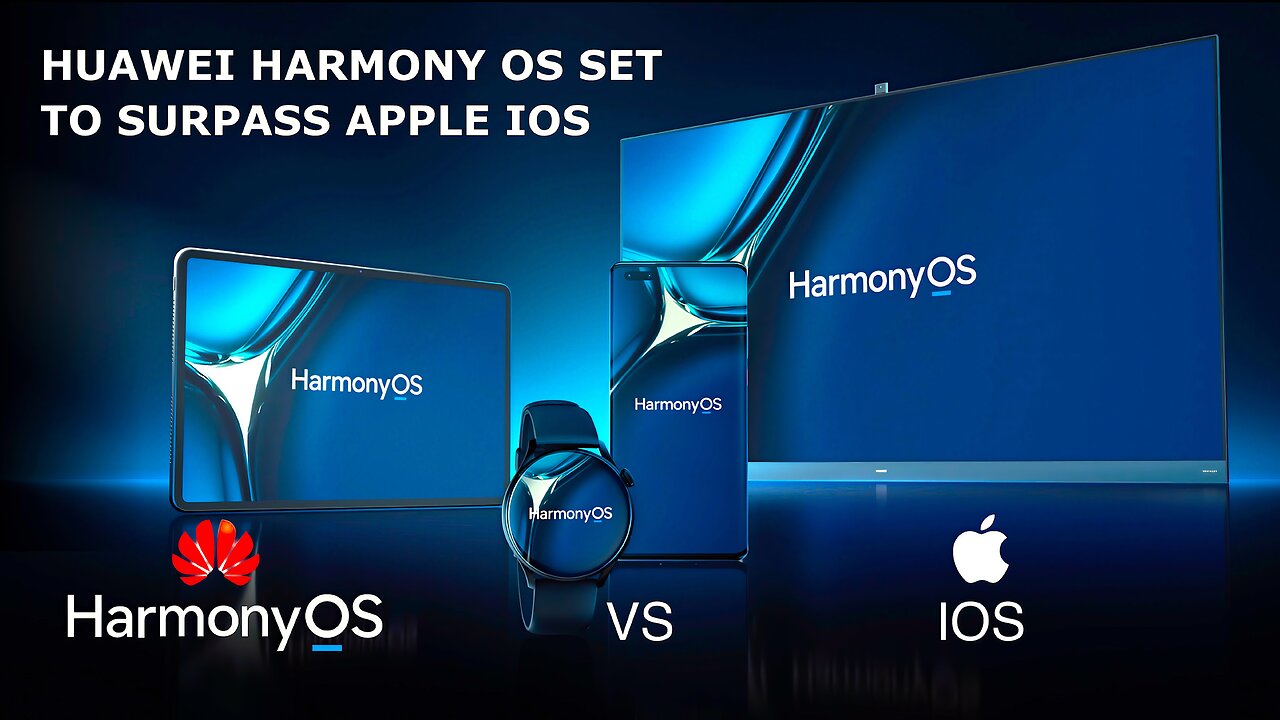Premium Only Content

Huawei Harmony OS Set to Surpass Apple iOS
Huawei Harmony OS Set to Surpass Apple iOS: A Detailed Analysis
Introduction:
In recent years, the battle between smartphone operating systems has predominantly been fought between Apple's iOS and Google's Android. However, a new contender, Huawei's Harmony OS, has emerged with the potential to disrupt the market dynamics. In this post, we will delve into the features and potential of Huawei Harmony OS, analyzing how it could surpass Apple iOS.
1. Versatility and Cross-Platform Integration:
One of the key advantages of Harmony OS is its versatility and ability to seamlessly integrate across various devices. Unlike Apple's iOS, which is limited to iPhone and iPad devices, Harmony OS can be used in a wide range of smart devices, including smartphones, tablets, smart TVs, wearables, and even in-car entertainment systems. This cross-platform capability allows users to have a consistent and unified experience across all their connected devices, setting Huawei apart from Apple, which continues to keep iOS limited to a select few devices.
2. Enhanced Security and Privacy:
Another area where Harmony OS has the potential to outperform iOS is in security and privacy features. Huawei has made significant investments in improving the security of its devices, and Harmony OS is no exception. It features a robust security framework that leverages advanced encryption algorithms and sandboxing techniques to protect user data and prevent unauthorized access. With growing concerns over data privacy, Harmony OS could offer a compelling alternative to iOS, which has faced numerous privacy scandals over the years.
3. App Ecosystem and Compatibility:
Apple has long been praised for its well-established and extensive app ecosystem. However, Huawei is making significant strides to develop a thriving ecosystem of its own. While initially challenging, Huawei has managed to attract developers to optimize their apps for Harmony OS, ensuring compatibility with their devices. Additionally, Harmony OS also supports Android apps, meaning users can access an even wider range of applications through Huawei's AppGallery and third-party app stores. With consistent efforts and growing developer support, Harmony OS has the potential to provide a rich app experience akin to iOS.
4. Seamless Integration of AI and IoT:
Huawei has a strong focus on artificial intelligence (AI) and the Internet of Things (IoT), and this is reflected in Harmony OS. The operating system is designed to seamlessly integrate AI capabilities across devices, enabling efficient data processing and personalized user experiences. Whether it's smart home devices, wearables, or AI-powered features on smartphones, Harmony OS aims to offer a cohesive ecosystem of interconnected devices, surpassing Apple's iOS in terms of AI and IoT integration.
5. Independence from Third-party Dependencies:
One of the key motivations behind Harmony OS development was Huawei's desire to reduce dependence on external entities, particularly Google's services, due to trade restrictions imposed by the United States. Unlike iOS, which relies heavily on Apple's ecosystem, Harmony OS offers a more independent approach. This independence allows Huawei to have greater control over the development and evolution of its operating system, providing a unique experience to its users.
Conclusion:
It's important to note that surpassing iOS will not be an easy feat for Harmony OS, considering Apple's established brand presence and loyal user base. However, Huawei's ambitious approach, coupled with its commitment to innovation, security, and versatility, presents a compelling case. If Huawei continues to invest in Harmony OS development, attract more developers to its ecosystem, and address concerns surrounding app availability, it has the potential to become a worthy competitor to Apple's iOS, disrupting the smartphone operating system landscape in the process.
-
 LIVE
LIVE
Game On!
16 hours ago $2.58 earnedWe have a MASTERS CHAMPION!
22,067 watching -
 12:27
12:27
Tactical Considerations
14 hours ago $2.18 earnedTop 3 Striker Fired Pistols That DOMINATE The Range in 2025
15.8K3 -
 25:35
25:35
JasminLaine
14 hours agoLiberals CAUGHT Planting Evidence to Frame Poilievre—CBC Host Gets FACT-CHECKED Into Oblivion
10.5K26 -
 1:37:56
1:37:56
TheDozenPodcast
19 hours agoWhy Capital PUNISHMENT needs restoring: Ex Detective exposes Child Protection Unit
13K3 -
 LIVE
LIVE
BEK TV
2 days agoTrent Loos in the Morning 4/14/2025
319 watching -
 20:18
20:18
DeVory Darkins
15 hours ago $22.43 earnedTrump SMACKS DOWN media as Democrats cry for Pete Hegseth to be Fired
55.1K137 -
 3:11:18
3:11:18
Badlands Media
1 day agoThe Narrative Ep. 18: Leaders of the Golden Age
135K41 -
 28:03
28:03
Adam Carolla
15 hours ago $12.46 earnedFraud, Corruption & Minecraft Mayhem - Gen Z's new Cult Classic | The Adam Carolla Show | #news
85.9K28 -
 2:37:08
2:37:08
TheSaltyCracker
13 hours agoTrump is The People's Champ ReeEEeE Stream 04-13-25
211K266 -
 4:24:35
4:24:35
Due Dissidence
21 hours agoDave Smith and Douglas Murray THROW DOWN, Judge OK's Khalil Removal, Maher Dishes on Trump Summit
74.7K72